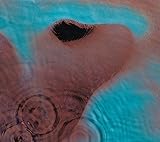
Ranking Pink Floyd’s 15 Studio Albums
All right, yeah. We’re ranking Pink Floyd albums. So what?
Before we get into things, let’s make one thing clear. This list is subjective and might be wrong in your eyes, but shut up because it also might be right. We’re just having fun over here! No reason to get mad! The fact is that sometimes you gotta look at one of the most iconic bands in the history of modern record music and examine what made them get to that point. Gotta get ready for that next argument at a party, eh?
Here’s our attempt at crafting the definitive rankings of one of the best ever to do it.
(Don’t worry, there’s a comment section below for you to tell us how we are wrong.)
15) A Momentary Lapse of Reason (1987)

Why It’s Pink Floyd’s “Worst” Album
Released in 1987, A Momentary Lapse of Reason is the first Pink Floyd album created without founding band member Roger Waters. We don’t want to get into the personal battles between members, but it’s also impossible to talk about this band without getting into the personal conflicts between members. The short of it is that Waters left the band in 1985, claiming it was creatively over, but Gilmour kept it going. Some legal battles ensued over the Pink Floyd name. But Gilmour persisted. Eventually, they’d settle out of court, and Gilmour continued with the Pink Floyd name, starting with A Momentary Lapse of Reason.
You can think of Pink Floyd’s A Momentary Lapse of Reason also as a solo album from guitarist David Gilmour. We know it’s last on this list, but that’s not to say it doesn’t still rip. Here, Gilmour does show off a bit — he proudly claimed this record was a return to the sound that made Pink Floyd. And with that observation, he’s not wrong. Tracks like “Learning to Fly” or “The Dogs of War” are vintage Pink Floyd. But we’d be remiss not to note that there is… something missing. At various points on the record, there’s an apparent attempt to recapture some magic. Sometimes, that works, and the album soars. More often than not, though, it feels a little lost, like dressing in clothes that once felt fresh to remind yourself of how you once felt.
Nonetheless, it should be respected within the canon (even though Roger Waters wasn’t shy in sharing that he hated it). And considering all the friction that led up to this album’s recording and eventual release, the fact the album is cohesive and of any quality at all is a miracle. If any other artist made a record like A Momentary Lapse of Reason, we might celebrate it as a foundational work to the prog rock genre. But as a Pink Floyd album, it feels more like a necessary part of the band’s trajectory and evolution — a step at the time they needed to take to get through a divorce to ensure the future had potential.
14) The Division Bell (1994)

Why It’s Pink Floyd’s 14th Best Album
Sorry to rag on David Gilmour here, but his follow-up to A Momentary Lapse of Reason didn’t deliver, either. The Division Bell, released in 1994 and primarily written and recorded with keyboardist David Wright, is a challenging listen. Not because the album is terrible, but because it feels empty — or, at worse, a bit soulless while trying really, really, really hard to make a statement. Gilmour was trying very hard to make an excellent record with The Division Bell, and how hard he tries is evident by just how extra it all sounds.
Much of the record’s lyrics focus on the theme of communication. And although Gilmour says otherwise, many critics and fans over the years have assumed these lyrics are about the guitarist’s strained relationship with Waters. He’s denied it, of course, but with the following lyrics, it’s hard not to imagine what this is about.
So I open my door to my enemies
And I ask could we wipe the slate clean
But they tell me to please go fuck myself
You know you just can’t win
The Division Bell isn’t a bad album, though. And something is charming in how much Gilmour puts into it. He’s trying to craft something here, proving himself against the legacy that is Pink Floyd. We hope The Division Bell continues to age gracefully, an artistic example of how to deal with frustrating loved ones.
- EDITORIAL REVIEWS (2-LP set + MP3) 2014 Reissue
13) The Endless River (2014)

Why It’s Pink Floyd’s 13th Best Album
Pink Floyd’s The Endless River is the band’s last record — at least that was according to David Gilmour when it was initially released in 2014. We’re almost a decade out, though, and it remains the final album, so it seems like this is it. And it feels like a final album, too. What do we mean by that? Well, for starters, we don’t hear any vocals from Gilmour until 18 tracks — 46 minutes! — into The Endless River. It takes quite a bit of ego to craft a record that way, but that’s also in line with the legacy of Pink Floyd. Imagine heading into the studio and arming yourself with the results of an extremely commercially successful five-decade-long career.
Here’s Gilmour, a legit musical pioneer, sitting on an endless amount of cash and time (with a considerable legacy at the front of his mind), crafting a fearlessly experimental record. That boldness leads to some truly captivating moments. Sure, this type of experimental music creation is slightly different from sitting with a few instruments after inhaling psychedelics in the late ‘60s. Still, Gilmour’s attempt to swing for the fences and honor the Pink Floyd legacy through over-the-top recording demands respect. This results in strange but vibrant recordings like “Sum” and “Skin,” two killer tracks that recall the proggy weirdness of Pink Floyd while sounding fresh.
And it also results in a whole lot of glut. At times, The Endless River feels aimless, wandering, and even lost — but you can’t help but wonder if that’s also the point. Gilmour’s lyrics pay tribute to various members of the band over the years — even the hated Waters on “Louder Than Words” (“We bitch and we fight…”) — and it seems he’s trying to wrap the band’s legacy up while appropriately honoring it. It’s not the glory days, but the result is something to be applauded.
12) The Final Cut (1983)

Why It’s Pink Floyd’s 12th Best Album
It’s a miracle that The Final Cut, the final Pink Floyd album with Roger Waters released in 1983, exists at all. But then again, Roger Waters is a man not known for being stopped, so maybe it always would’ve made it out. The story goes that the recording sessions were plagued by conflict with Gilmour and Waters constantly at each other’s throats. In fact, Gilmour didn’t believe most tracks weren’t even properly finished.
And yet, here it is, a twisting, galloping concept album that shamelessly wears its heart on its sleeve as it tries to make sense of it all.
Retrospectively, the album is of a higher quality than how it was initially received. Famously, NME called it trash, and Robert Christgau gave it a C+. We’re here to say it’s better than that! But also, not by much. As the successor to The Wall, Waters used The Final Cut to explore his troubled grief regarding his father’s death during World War II. He reckons with some big questions — and does so a bit… overtly… you might say. For example, the record’s opening track is called “The Post-War Dream” and contains the following lyric after questioning whether or not he watched too much TV: “What have we done to England?” Sheesh.
Then again, Waters has never been shy with his earnestness, and perhaps that’s one of the lasting appeals of Pink Floyd and why they’ve been such an impactful artist for multiple generations. The Final Cut could’ve used a few more rounds of edits, but we’re not here to claim we know better. Similar to The Endless River, Gilmour’s last act as Floyd, it’s entirely something to behold. A good lesson for us all: Even if you don’t hit the home run, don’t let that stop you from swinging for the fence.
11) Atom Heart Mother (1970)

Why It’s Pink Floyd’s 11th Best Album
If there’s a Pink Floyd album in this ranking that we can call goofy, it’s Atom Heart Mother. The band’s fifth studio album — they were crankin’ albums out during the first few years of existence — was released in October 1970. It was the first significant break into commercial success (something that would continue for the rest of time) as it went number one in the UK.
But back to that goofy thing. Atom Heart Mother is when the band started to expand its approach to concept writing. But it doesn’t quite hit, so the risk-taking sounds a little… off. The album is divided into two distinct sections — the first half is more traditional rock ‘n’ roll while the second half is more experimental and progressive.
The title track, though, is what it’s all about, or at least what the band tried to make it all about. “Atom Heart Mother” is an extended suite piece featuring a classical orchestra, choir, and synthesizers. Clocking in at around 23 minutes long, it’s quite the ride — but at times feels more like the band is trying to show off versus making any real artistic statement. (Something that band members would agree with later, basically stating that Atom Heart Mother was a stinker.)
Our preferred tracks are the bluesy “Fat Old Sun” and the whimsical “Alan’s Psychedelic Breakfast.” (Unrelated: Best song name ever?) Regardless, Atom Heart Mother remains an exciting step for the band — you can hear them bridging into their future selves that would deliver concept classics like The Dark Side of the Moon or Wish You Were Here. It was a crucial moment for their artistic growth and helped them develop into psychedelic prog rock stalwarts.
- EDITORIAL REVIEWS 196587943226- 2-disc package in a 7-inch sleeve, containing the Atom Heart Mother album on CD and a Blu-ray disc featuring newly discovered film of the performance from over 50 years ago
- Originally only released in Japan in 2021, the set contains some unique memorabilia "&"ndash; a special photo book containing many rare, never-seen-before photos, reproductions of the pamphlet, the poster, the concert ticket, and the flier distributed at the event
- The Blu-ray has two pieces of video footage on it: Atom Heart Mother (Live: Hakone Aphrodite 1971)"&"nbsp; 16:08 Scott "&"amp; Watts (behind the scenes documentary clip)"&"nbsp; 3:11 Additional"&"nbsp; Packaging Items: * 60-page photo book with unreleased photos * Replica of Hakone Aphrodite pamphlet * Replica of venue map flyer * Replica of Osaka show poster * Replica of Hakone Aphrodite ticket 88875184221- * Original vinyl packaging has been lovingly replicated with special care * Pressed on 180 gram vinyl for optimum stereo sound quality * Gatefold sleeve * Pink Floyd"&"rsquo;s first recordings with an orchestra * First Pink Floyd album to reach Number 1 in the UK
10) A Saucerful of Secrets (1968)

Why It’s Pink Floyd’s 10th Best Album
It’s easy to forget about the strange albums before Pink Floyd became the prog rock masters of the ‘70s. But in the late ‘60s, the group rose in Britain with a messy, dirty approach to psychedelia. For a prime example, look no further than Pink Floyd’s 1968 record A Saucerful of Secrets.
This album — a dynamic hodgepodge of sounds that feel scraped and taped together with scotch tape — was recorded partly during the sessions that produced the group’s first album, The Piper Gates at Dawn. Pink Floyd’s original bandleader, guitarist, and songwriter Syd Barrett led the initial recording sessions but struggled immensely during this period. Famously a hermit, he was having challenges with mental health while apparently using a lot of psychedelics. The results of that erratic behavior give A Saucerful of Secrets (and The Piper) their beauty, this feeling of whimsical psychedelic sketches and extensions of a wandering mind with a quiet approach to fluttering rock ‘n’ roll.
But Barrett’s ability to channel these delicate textures could also explain why he didn’t like the limelight. During the recording of A Saucerful of Secrets, David Gilmour was added to the group to help support Gilmour’s guitar playing. During performances, Barrett would walk around on stage, joining in and playing here and there while Gilmour kept it steady. But this wasn’t sustainable.
Barrett was eventually booted from the band in 1968 before the release of A Saucerful of Secrets. He flirted briefly with a solo career — and if you like this era of Pink Floyd, we highly recommend his solo albums The Madcap Laughs and Barrett, both recorded around this time — before heading into a self-motivated exile. These early Pink Floyd albums are remnants of his bold and strange creativity, a slippery approach to psychedelia that would texture the band’s sound forever.
9) The Wall (1979)

Why It’s Pink Floyd’s 9th Best Album
Speaking of Syd Barrett, Pink Floyd’s final album of the ‘70s, the prog-rock epic The Wall, is a concept album conceived by Roger Waters that’s widely understood to be about Barrett’s exit from the band and, in turn, the music industry at large. The record is Waters’ genuine attempt at a masterpiece, with recording sessions from 1978-1979 worldwide, including in France, Switzerland, New York, and Los Angeles.
The idea for the record was borne out of a famous incident in 1977 at the close of the In the Flesh tour in Montreal — audience members didn’t seem to give a shit what was going on, resulting in a frustrated Roger Waters spitting on a fan. This led to Waters wanting to create a piece of art exploring the schism he’d seen happen throughout the ‘70s between music fans and musicians. He believed concerts had become social events, with experiencing the music being deprioritized. So he began work on The Wall. As we’ve noted, Waters wasn’t one for… subtleties.
Anyway, Pink Floyd’s The Wall recording sessions were famously chaotic. Friction within the band during this time also caused Waters to fire keyboardist Richard Wright. Lots has been documented about this period, and we suggest reading drummer Nick Mason’s memoir to get a true sense of how crazy things were. Apparently, producer Bob Ezrin was the only person Waters could connect with while trying to sort out his despair and frustration. Meanwhile, the music continued to sprawl out of control. Children’s choirs were brought in. New instruments tapped. In other words, think about any absurd rock ‘n’ roll cliche you can imagine — it probably happened during these recording sessions. But the band did finally get things in order and finalize the record.
The reception of Pink Floyd’s The Wall was divided upon its release. Some critics viewed it as a bold, sprawling display of pure rock star power. This is what can happen when you pair unlimited money with endless creativity. On the other hand, other critics weren’t so sure, pointing out how the double album was also bloated, overwrought, and pretentious — another result of what happens when you pair unlimited money with endless creativity. (It’s also safe to say that Roger Waters doesn’t have the smallest ego.) The reality is that the album is somewhere in the middle. Nonetheless, the album sold about a gazillion records upon its release, so clearly, someone liked it.
In truth, The Wall isn’t as focused as the other Floyd records of the ‘70s, which is ultimately its downfall. Or maybe another way to look at it is that it’s a little too focused. Waters strives to make his points known. Regardless, it’s a psychotic and incredible depiction of what rock ‘n’ roll stardom could produce in 1979, for better or for worse.
- EDITORIAL REVIEWS Pink Floyd s The Wall is one of the most acclaimed concept albums of all time selling over 23 million copies in the US alone
8) Ummagumma (1969)

Why It’s Pink Floyd’s 8th Best Album
A decade before The Wall, Pink Floyd released Ummagumma, a double album that featured both live and studio work — and, in standard juvenile rock star nature, was named after the Cambridge slang word for “sex.” Nice.
Anyway, Ummagumma is a psychedelic collection of tracks that showcase an early Pink Floyd figuring out the edge between getting too lost in the sauce, and just lost enough. The live tracks are recordings of concerts at Mothers Club in Birmingham and the College of Commerce in Manchester. They offer a taste of a young, spritely band clearly influenced by substances and the worlds those experiences unlock. It’s a heady, trippy experience not too dissimilar to what some Americans known as the Grateful Dead were doing around the same time in San Francisco. In some of these recordings — in particular, the album’s title track — the band seems to embrace space as much as sound.
Later, the album goes through other movements, each member designated half an LP to do whatever they wanted. The group took this order: Richard Wright (“Sysypuhus” in four parts), Roger Waters (“Grantchester Meadows” and “Several Species of Small Furry Animals Gathered Together in a Cave and Grooving with a Pict”), David Gilmour (“The Narrow Way” in three parts), and Nick Mason (“The Grand Vizier’s Garden Party” in three parts). Each section offers its own take on space-y, psychedelic rock — presenting glimmers of a band full of personalities.
In many ways, Ummagumma is the beginning of Pink Floyd’s consistent drive to push the limits of concept albums and how recorded music could be presented. Why not give each member of the band carte-blanche to go nuts? Even if it sounds terrible, at least it’ll be interesting. That approach also lines up with the album’s cover, an image of each band member that continually falls into themselves.
- EDITORIAL REVIEWS * Mastered by James Guthrie, Joel Plante, and Bernie Grundman * Pink Floyd Records releases will be manufactured and distributed by Warner Music for the UK and Europe and by Sony Music for North America and the rest of the world "&"nbsp; "&"nbsp; "&"nbsp;
7) More (1969)

Why It’s Pink Floyd’s 7th Best Album
Is More an album or a soundtrack? That’s a good question — because it’s kind of both, and so when weighing it against the rest of the band’s discography, it’s essential to consider the film that it supported.
More, the film is an examination of the end of the hedonistic ‘60s. In the directorial debut of Barbet Schroeder, the plot follows a hitchhiker who falls for a mysterious woman and joins her on a trip to Ibiza. What happens there is a heroin-infused pursuit for the edge — wild parties, love-making, and substance abuse. More, indeed.
Pink Floyd crafted the score for the film — including songs that would become live staples like “Green Is the Colour.” The spacey sketchbooks align perfectly with the film’s messaging. Is this all there is? Drugs can enhance our human experience, but when that human experience isn’t fulfilled — they highlight the emptiness.
That’s the balance that Pink Floyd’s music holds in its sound, and on More, they channel it well. That’s why we’ve got it higher on the list than other expected records. Right here is a true quest to understand the psychedelic unknown, pushing the brain against the skull (maybe with outside assistance) as an attempt to sort out what it means. Why not be beautiful and young and dumb and go to Ibiza and shoot up heroin and get lost in the sun? The pursuit for more only offers so much — and frankly, it’s never really that easy.
Oh, “The Nile Song” rips, too.
- EDITORIAL REVIEWS Pink Floyd's first film soundtrack from 1969 on heavyweight vinyl within a replica of the original packaging
- Mastered by James Guthrie, Joel Plante and Bernie Grundman and pressed on 6
- 1 oz (180 g) vinyl for optimal sound quality
6) Obscured by Clouds (1972)

Why It’s Pink Floyd’s 6th Best Album
Obscured by Clouds is Pink Floyd’s seventh studio album. Released in 1972, it was written by the band while on tour in France for La Vallée, another film by French filmmaker Barbet `Schroeder. Clearly, the two parties found something special together creatively…
Unlike other Pink Floyd records, Obscured by Clouds isn’t full of 20-minute-long songs and wandering psychedelia. Instead, it’s a more traditional rock album with standard song structures, showcasing the band’s versatile songwriting ability. On the whole, the record is slightly folkier and more charged than the earlier work in the band’s discography. And yet, due to the massive impact of later albums in the ‘70s like The Dark Side of the Moon and Wish You Were Here, Obscured by Clouds is a bit overlooked by Pink Floyd fans and scholars.
Despite that, the album features some of the group’s best songwriting. “Free Four,” in particular, is a track that chugs along, poppy and Beatles-esque. Meanwhile, “Wot’s…Uh The Deal” shows off the band’s blues skills while “The Gold It’s In The…” just rips. The texturing of the Obscured by Clouds comes together for something powerful and majestic, ultimately standing as a testament to Pink Floyd’s musical virtuosity and remarkable songwriting ability.
Plus, how good is that album art? Our recommendation: Get this album on the turntable, get stoned, and get lost in the clouds.
- EDITORIAL REVIEWS * Mastered by James Guthrie
5) Animals (1977)

Why It’s Pink Floyd’s 5th Best Album
Fuck capitalism, eh? Pink Floyd agrees.
Released in 1977, Pink Floyd’s tenth studio album Animals is a concept album that ruminated on the state of Britain at the time of its release. The record’s themes — baked into lyrics that fly above bulldozing and rollicking rock ‘n’ roll — center on the issues of class, power, and greed. The lyrics often wander into overtly dark and pessimistic areas, highlighting the garbage wealthy people that run the world and how they take advantage of the masses — and how that cycle spins on and on, and there’s nothing we can do about it. Uplifting stuff, we know.
However, the boldness of Animals is pure Pink Floyd. Dynamic and dramatic lyrics draped in psychedelia. A concept album cranking the throttle to the max, critiquing society while presenting an innovative blend of prog rock and jazz. Pointing out the systems that keep society oppressed might seem like a pretty big topic to tackle as a rock band, but if you’re willing to shamelessly name songs “Dogs,” “Pigs (Three Different Ones),” or “Sheep” and throw some literal recordings of pigs oinking on the tracks, maybe the audaciousness should be respected.
Let’s not forget this record sails, too. For being draped in such a negative outlook on the state of the world, it’s a real joy of a listen. The sweeping guitar towards the end of “Pigs (Three Different Ones)” is enough to justify this record’s legacy. Pink Floyd were the masters of using space to showcase licks — and Animals might do that better than any other record in their discography.
4) The Dark Side of the Moon (1973)

Why It’s Pink Floyd’s 4th Best Album
Is there a more Pink Floyd record than The Dark Side of the Moon? Released in 1973, it’s not only the most recognizable album in the band’s discography — it might be one of the most recognizable albums in the history of recorded music. Upon its release, it propelled Pink Floyd to worldwide fame — becoming the band’s first No. 1 album in the United States (and eventually getting certified platinum in 1998). Dark Side of the Moon has sold more than 45 million copies to date.
With recognizable artwork that’s been lining the walls of dorm rooms for nearly five decades and a generation of boomers who like to argue the only good music ever recorded happened in the early ‘70s, it’s easy to assume this record maybe doesn’t hold its weight in influence or prestige — that perhaps it’s just some cliche psychedelic bullshit for 19-year-olds with bongs and too much time to think about what it all means. To that observation, we saw two things: 1) Sure, yeah, you’re probably correct on some level, but 2), Shit man, when was the last time you actually listened to Dark Side of the Moon?
Tired of lying in the sunshine, staying home to watch the rain
You are young and life is long, and there is time to kill today
And then one day you find ten years have got behind you
No one told you when to run, you missed the starting gun
These lyrics from “Time” capture the brilliance of Pink Floyd’s songwriting. Life is a maddening spiral, constantly transforming around our existence. Sometimes we grab the challenges; other times, they seize us. The spinning pressure of mortality is always staring at us — but do we look back at it? Dark Side of the Moon ruminates on these struggles — “The Great Gig in the Sky,” “Us and Them,” and “Money,” all offering different takes on how to ride the waves of modernity.
They don’t offer much in terms of how to handle the obstacles. What The Dark Side of the Moon gives is a more nuanced take on these big subjects, a bit more lyrical and sophisticated than later overt epics like The Wall. Sonically, matching the melodic approach, there’s a path the narrators provide towards endurance: “Hanging on in quiet desperation is the English way,” Waters later sings on “Time.” “The time is gone, the song is over, thought I’d something more to say.”
If only knowing what to say was easy.
- EDITORIAL REVIEWS PINK FLOYD / DARK SIDE OF MOON - Vinyl LP
- The Dark Side of the Moon is the eighth album by the English rock band Pink Floyd
- Originally released on 1 March 1973, on the label Harvest, it built on ideas explored in the band's earlier recordings and live shows, but departs from instrumental thematic by founding member Syd Barrett
- The album explores themes including conflict, greed, the passage of time, and mental illness, the latter partly inspired by Barrett's deteriorating mental state
- - Developed during live performances, an early version was premiered several months before recording began; new material was recorded in two sessions in 1972 and 1973 at Abbey Road in London
3) The Piper at the Gates of Dawn (1967)

Why It’s Pink Floyd’s 3rd Best Album
Pink Floyd’s debut album The Piper at the Gates of Dawn is a fascinating study of what could have been. Released in August of 1967, the record is the only entry in the band’s lengthy discography conceived and constructed under the leadership of founder Syd Barrett. It features tracks like “Astronomy Domine,” “Interstellar Overdrive,” and “Flaming,” examples of the band tapping into the sound of the space between, the psychedelic energy that connects us all.
In many ways, Barrett was the foundational mind that became the Pink Floyd spirit. Fearless. Explorative. Innovative. Bold. Originally trained as a painter, he approached songwriting similarly to his brush stroke — loosely patching and stitching ideas together to form complete concepts. He wrote aggressively, utilizing innovative production techniques to pull together sounds that didn’t traditionally go together. During the recording sessions, he was also heavily using psychedelic drugs, entering profound headspaces that birthed incredible music but at a cost to his mental state.
Barrett broke himself chasing the taste of absurdity. If you’ve ever taken psychedelic drugs, you know how the in-between is enhanced. These big, youthful questions become motivators, helping us push towards trying to solve life’s greatest questions with the right chord or line of poetry. After the trip has finished, the questions remain, of course, because they always remain — but the in-between states have been enhanced. Life shines brighter. But pain hits harder.
Following the recording sessions of The Piper Gates of Dawn, Barrett was eventually asked to leave the band — his drug usage had caused his behavior to become highly erratic. But his imprint on the approach to creating music, this idea to go boldly into the unknown, stayed with the band forever.
- EDITORIAL REVIEWS 180g ,,NEU / VERSCHWEISST
- - 180g -
- Label: Pink Floyd Records
- Published: 2016
2. Meddle (1971)

Why It’s Pink Floyd’s 2nd Best Album
There’s a bridge that exists between Syd Barrett’s patchy psychedelic Pink Floyd and the crisp concept-obsessed Pink Floyd that would go on to sell millions and millions and millions of records (the latter ironically becoming the very form of capitalism the band made art in protest during its early years, but there’s no need to get into that now).
That connector is Pink Floyd’s sixth studio album, Meddle, which was released in 1971. With Meddle, the band started to embrace the clean guitar work of David Gilmour, something that would grow more and more influential on the group’s sound throughout their career. Moreover, they began to play with synthesizers, exploring their wavy potential and accessing and enhancing the stretches in between musical notes.
At this point, the band wasn’t selling an insane amount of records — but they were living comfortably. That allowed them to continue playing around in the studio, taking hours and hours to perfect certain guitar riffs, manipulate sound effects, or tap into whatever other ideas a few musical geniuses get while trapping themselves in a recording studio for an extended period. This playfulness helped them unlock ideas that would become foundational to prog rock. It also probably encouraged them to take risks, like recording a 20-minute song called “Echoes.”
It’s this element that ranks Meddle so high on our list. There are probably cleaner ideas of songs on a record like The Wall, but that album is also marred with overthinking and overwrought sounds. They take this process too far, driven by the desire to make something so distinguished and beautiful that it loses its soul.
Meddle doesn’t suffer from that self-editing. While carrying Barrett throughout it, there’s a looseness to the sound — a lack of control that brings the songs to life. “Fearless,” “San Tropez,” and “Seamus” are all risks, approaching the different worlds of folk, blues, and jazz to capture a psychedelic atmosphere.
1) Wish You Were Here (1975)

Why It’s Pink Floyd’s Greatest Album of All-Time
Loss is pain. Longing for what was once before — that borders devastation. We humans are complicated creatures, eh? Striving to harness heartbreak, to capture soulful moments, to walk between the lines of existence in quest of truth. Inside those moments, there’s a fleeting feeling of clarity. What was once may not always be, and what’s coming will surely not last. Can we grab that flying thought and push toward self-actualizing? Maybe if we snatch it, then it’ll all make sense. Just maybe.
These slippery thoughts and questions are what define Pink Floyd’s Wish You Were Here, which was released in 1975. The record is their crowning achievement, an album that brilliantly drives towards understanding oneself in the context of friends and families. In the simplest of terms, it’s a concept album that explores themes of absence and alienation. Musically, it’s haunting and elegant, flowing together breathlessly underneath somber lyrics of doubt and regret. What is human connection? Why is it not more simple? Why isn’t anything simple?
Pink Floyd’s Wish You Were Here might be one of the greatest albums ever written about friendship. Considered Roger Waters’s swan song to Syd Barrett, the songs quietly ruminate on a musical life without the original Pink Floyd member. He’d been fired from the band seven years before these recording sessions, and during that time, the group had grown from creating psychedelic sketch art to full-blown, commercially successful concept albums.
Across Wish You Were Here, Waters sings for his old friend. The 9-part “Shine On You Crazy Diamond” expresses his compassion towards Barrett’s mental health — and then Waters goes on the offensive, using “Welcome to the Machine” and “Have a Cigar” as passionate indictments of the music industry. There’s self-aware friction, too. Ending “Machine,” Waters seems aware of the band’s participation: “You dreamed of a big star / He played a mean guitar / He always ate in the Steak Bar / He loved to drive in his Jaguar / So welcome to the machine.”
The album’s title track, though, is where Pink Floyd’s soul shines and what puts this album over the top of the rest in their discography. Apparently, midway through the recording sessions for Wish You Were Here, Barrett dropped by for a visit. Overweight and bald, the band barely recognized him. He said he was there to help, but it was clear his mental state was unwell. He left. From there, he went further into isolation, and it’d be the last time band members would see him.
That longful pain is engraved in Waters’ voice as he croons. “Running over the same old ground, what have we found?” He pushes boldly forward. “The same old fears… Wish you were here…”
Who do you miss? Or further, what do you miss? Indeed, we must forget nostalgia to embrace the now or risk wallowing away in depression, wishing for something that was and will never be again. That doesn’t change the fact that the times were good though.
Because the times, man, they were good.
- EDITORIAL REVIEWS Pink Floyd: David Gilmour (vocals, guitar); Richard Wright (vocals, keyboards, VCS3 syntheszier); Roger Waters (vocals, bass); Nick Mason (drums)
- Additional personnel: Roy Harper (vocals); Dick Parry (saxophone); Venetta Fields, Carlena Williams (background vocals)
- Recorded at Abbey Road Studios, London, England from January-July 1975
- The breakthrough success of Dark Side of the Moon made Wish You Were Here a crucial follow-up in strictly commercial terms
- Further pressure came from it being Pink Floyd's first recording for a new label, Columbia




















